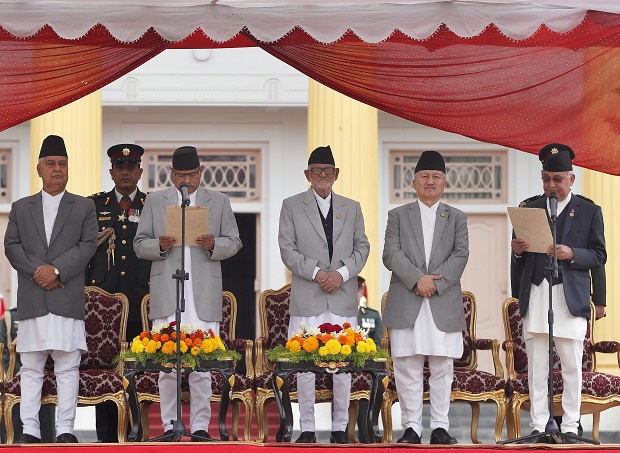
Nepal’s President Ram Baran Yadav, second left, administers the oath of office to newly elected Prime Minister Khadga Prasad Oli, right, at the Presidential building in Kathmandu, Nepal, Monday, Oct. 12, 2015. Nepal’s new prime minister took the oath of office Monday and appointed the leaders of groups that are protesting the new constitution as his deputies. AP
KATHMANDU, Nepal — Nepal’s new prime minister appointed two deputy premiers on Monday, including an ethnic community leader who has rallied hundreds of protesters in blocking fuel and goods shipments from India for weeks and plunged the Himalayan nation into a fuel crisis.
Prime Minister Khadga Prasad Oli appeared to be reaching out to the protesters by choosing Madhesi group leader Bijaya Gachchedar as one of his deputies, though his Madhesi People’s Rights Forum is not the main Madhesi group involved in the protests. That group, called the United Democratic Madhesi Front, has vowed to continue the protests at the main border crossing through which India sends most of its trade to Nepal.
Oli also appointed Hindu nationalist Kamal Thapa as a deputy premier. Thapa’s party has protested the constitution adopted two weeks ago because it wants the secular country to be restored as a Hindu state.
Soon after taking the oath of office, Gachchedar told reporters that he joined the government to help resolve the protests in southern Nepal.
“The issues, differences and demands of the Madhesi and other groups will be resolved by adjusting the states through amendments in the constitution,” Gachchedar said adding the government would get the support of all political parties to make the changes.
Oli was sworn in by President Ram Baran Yadav a day after he was elected in Parliament with support from smaller parties.
In Washington, State Department spokesman Mark Toner said Monday the US “encourages all political stakeholders to fully engage in a democratic process that accommodates the aspirations of all Nepalis.”
The protests by the Madhesis and other ethnic groups in the south for weeks have disrupted cross-border traffic, causing a severe fuel shortage. India, which has close ties to the Madhesis, denies there is a blockade and says drivers are afraid to enter Nepal, though Nepal says there is no trouble at many crossings.
Scores of trucks, including fuel tankers, entered Nepal on Sunday and Monday from two borders points in southwestern Nepal, but the borders at south and southeast Nepal remained blocked.
Home Ministry spokesman Laxmi Dhakal said there were no problems in most of the border points but was unable to explain why border officials on the Indian side were stopping trucks and then letting some pass.
The constitution divides Nepal into seven new states, with some borders slicing through the Madhesis’ ancestral homeland in the southern plains. The Madhesis, along with several other small ethnic groups, want the states to be larger and to be given more autonomy over local matters.
Talks last week between the government and protesters made little progress.
RELATED STORIES
Nepalis adapt to fuel shortage by carpooling, riding bikes
Protests in Nepal causing shortages of gasoline, medicine

